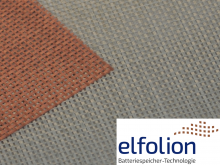Development of heavy tows from recycled carbon fibers for low-cost and high performance thermoset composites (rCF heavy tows)
Raw materials Fibres Yarns Composites Textile machinery Recycling Sustainability Circular economy Technical Textiles
Abstract
Within the framework of the IGF research project (21612 BR), the entire process chain for the industrial production of novel twist-free rCF heavy tows was developed at ITM. In particular, a novel technology for the production of rCF heavy tows based on recycled carbon (rCF ≥ 90 vol.%) and hot melt adhesive fibers (< 10 vol.%) was designed, constructed and successfully implemented. This includes fiber preparation, the carding process for card sliver formation, the stretching process for drawn sliver formation, and the final fabrication of the rCF heavy tows from rCF and hot melt adhesive fibers in a newly developed test set-up. The suitability of the developed technology is demonstrated by the implementation of rCF heavy tows with different rCF types, fiber lengths and fiber volume contents and a demonstrator. The developed rCF heavy tows with finenesses between 3000-7000 tex and their further processability into textile semi-finished products were successfully demonstrated. The developed rCF Heavy Tows and composites based on them exhibit a maximum composite tensile strength and a maximum Young’s modulus of 1158±72 MPa and 80±5.7 GPa, respectively. The rCF Heavy Tows are thus applicable for low-cost thermoset composites with high performance and complex geometry. Thus, the developed rCF Heavy Tows offer a very high innovation and market potential in the fields of materials and materials, lightweight construction, environmental and sustainability research, and resource efficiency. This opens up the opportunity for SMEs in the textile industry to develop new products and technologies for the fiber composite market and to establish themselves as suppliers for the automotive, mechanical engineering and aerospace, medical and sports equipment industries.
Report
Introduction, problem definition and aim of the project
Carbon fiber-reinforced plastics (CFRP) are increasingly used in lightweight applications due to their high stiffness and strength as well as low density, especially in aerospace, transportation, wind energy, sports equipment or construction. Global demand of CFRP is predicted to increase to 197,000 t/a by 2024, almost tripling compared to 2011. This shows an urgent need for solutions to recycle the high quality carbon fiber (rCF) in terms of the circular economy. This is necessary not only due to strict legal regulations, but also for ecological and economic reasons. In recent years, numerous research institutes and companies developed solutions for the reuse of rCF in the fields of nonwovens, injection molding or as hybrid yarns. However, the majority of these works involve the use of rCF in combination with thermoplastic fibers for thermoplastic composites. In the field of rCF-based thermoset CFRP, mainly rCF nonwovens made of 100% rCF have been so far developed. Since the fibers in the nonwovens mostly have a limited length and a low orientation and process-related additional high fiber damage occurs, with these materials only maximum 30% of the composite characteristic values of CFRP components made of carbon filament yarns can be so far achieved.
Currently, the matrix systems used in the field of high mechanical loaded CFRPs are predominantly thermoset. Such components exhibit high dimensional stability, high stiffness and strength as well as are suitable for the implementation of complex component geometries due to low-viscosity matrix systems. However, primary carbon filament yarns are particularly used for these components due to the insufficient properties of rCF. In addition to low sustainability, the utilization of these filament yarns result in at least 200 % higher cost. The production of primary carbon filament yarn requires a high-energy demand of about 230 MJ/kg with a CO2 emission equivalent to 20 kg CO2/kg CF. Here, a significant improvement of the CO2 balance is required to make a substantial contribution to the envisaged climate protection goals of the Federal Republic of Germany and the EU. For this reason, the focus of the project work is the development of novel, sustainable rCF heavy tows made of recycled carbon fibers (rCF) and associated manufacturing technologies for the implementation of cost-effective thermoset composites with high mechanical performance.
Acknowledgments
The IGF project 21612 BR of the Research Association Forschungskuratorium Textil e.V. was funded by the Federal Ministry of Economics and Climate Protection (BMWK) via the AiF within the framework of the program for the promotion of joint industrial research and development (IGF) on the basis of a resolution of the German Bundestag. We would like to thank the above-mentioned institutions for providing the financial resources.
Contact: mahmud.hossain@tu-dresden.de
Technische Universität Dresden
Fakultät Maschinenwesen
Institut für Textilmaschinen und Textile Hochleistungswerkstofftechnik (ITM)
01062 Dresden








